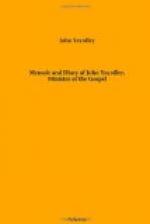After the Monthly Meeting was over, I had an opportunity to inquire into the cause of his appearance and trouble, and found that he was religiously concerned to attend weekday meetings, which his father was much averse to; and in order to procure his liberty he had worked almost beyond his ability; but all would not do, his father plainly telling him that he should quit the house. The evening before, he applied to him for leave to come to the meeting at Highflatts to-day; but he refused, and treated him with very rough language. However, as the concern remained with him, he rose early in the morning and got himself ready; but his father came and violently pulled the clothes off his back, and his shirt also, and took all his other clothes from him but those we met him in, telling him to get a place immediately, for he should not stop in his house. Being thus stripped, he went to his work in the stable; but, not feeling easy without coming to meeting, he set out as he was, not minding his dress, so that he might but be favored to get to the meeting.
This evening we had an opportunity with him in my parlor, much to our satisfaction. The language of encouragement and consolation flowed freely and plentifully towards him through William Wass, John Bottomley, and myself; and afterwards, in conference with him, we found liberty to advise him to return home (he having before thought of procuring a place), believing if he was preserved faithful, way would in time be made for him, and that it might perhaps be a means of his father’s restoration; as at times, he said, he appeared a little different, not having wholly lost his love to Friends, and always behaved kindly to them. He took our advice kindly, and complied therewith. After stopping two nights at my house, he returned home.
Joseph Wood did not suffer much time to elapse before he paid another visit to Blacker, to comfort the afflicted family. It was from this visit, as we apprehend, that John Yeardley dated his change of heart. “I was convinced,” he said on one occasion, “at a meeting which Joseph Wood had with our family.”
7 mo. 17, 1803.—Thomas Walker Haigh and William Gant accompanied us to Joel Yeardley’s, where we tarried all night; but the two young men from Barnsley returned home after supper. Joel was from home, but after tea we had a religious opportunity with the rest of the family, in which I had a very long consolatory and encouraging testimony to bear to the deeply-suffering exercised minds from John xvi. 33. Afterwards I had a pretty long time, principally to their son John, who I believe was under a precious visitation from on high. He was much broken and tendered, and I hope this season of remarkable favor will not soon be forgotten by him.
On his return home Joseph Wood wrote him the following letter:—
Newhouse, 10 mo. 24, 1803
Beloved friend, John Yeardley,




